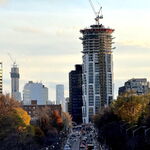Cities with the shortest and longest commute times
Here's something you might find interesting:
Commute time: calculated as the average time (in minutes) of a trip to and from work, based on: US: 2008 Canada, Europe, Sydney: 2006.
Cities associated with low commute times are considered to be more attractive places to live.
With the highest average commute time, Toronto ranks last among the 19 metro areas for which data are available. With the exception of New York, the US cities do well on this indicator. London, Montreal and Toronto are the only cities to receive “D†grades.
# cities ranked: 19
The Grade
# - City Name - grade - average commute time in minutes
1. Barcelona A (48.4)
2. Dallas A (53.0)
3. Milan A (53.4)
4. Seattle A (55.5)
5. Boston A (55.8 )
6. Los Angeles A (56.1)
7. San Francisco B (57.4)
8. Chicago B (61.4)
9. Berlin B (63.2)
10. Halifax C (65.0)
11. Sydney C (66.0)
12. Madrid C (66.1)
13. Calgary C (67.0)
14. Vancouver C (67.0)
15. New York C (68.1)
16. Stockholm C (70.0)
17. London D (74.0)
18. Montreal D (76.0)
19. Toronto D (80.0)
Data unavailable for Hong Kong, Oslo, Paris,
Shanghai, and Tokyo.
Source:
http://bot.com/Content/NavigationMenu/Policy/Scorecard/Scorecard_on_Prosperity_2010_FINAL.pdf
Interesting to see where these cities fit. Looks like cities with more highways tend to rank higher compared to those with more rapid transit systems (subways).
Toronto does not have an extensive highway network nor does it have an extensive rapid transit network. That's a leading reason why it placed dead last.
I've been to Barcelona and I agree with its #1 rank. Barcelona has excellent transport infrastructure whereas Toronto is severely lagging in transport infrastructure.
Thoughts?
Possible solutions:
-Get the Gardiner underground and add another lane or HOV lane in each direction
-Add HOV lanes along the DVP or convert one lane in each direction to HOV lanes.
-Add more lanes to the 401 where it needs it. Fix up bottlenecks at interchanges with the 427 and 404 to relieve congestion and increase overall traffic flow
-Extensive additions to the subway network and rapid transit
-LRT and rapid transit extensions in the GTA including a line to Pearson Airport
-Introduce a congestion tax similar to London (extreme)
-Build a high speed rail line or two to reduce long distance car commuting
-Expand GO Transit extensively
-Build Highway 448 in the existing power corridor to relieve congestion on part of the DVP and 401.






